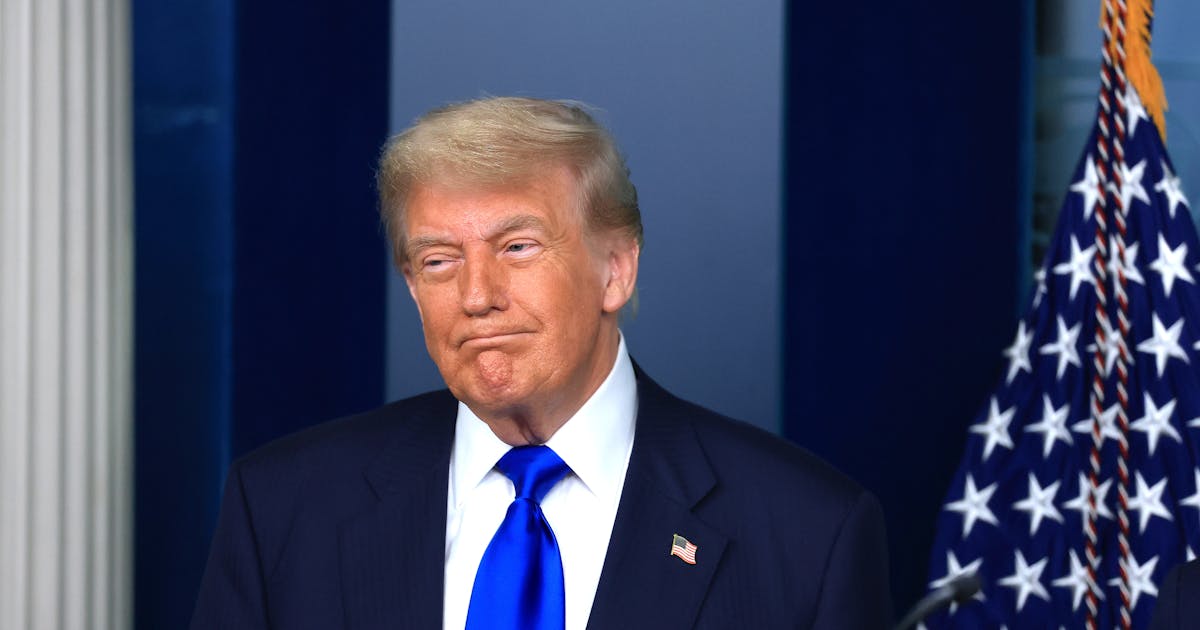
The Tariff Tempest: A Presidential Blunder and its Repercussions
The air in the political arena is thick with the scent of copy-paste errors and rapidly changing stances, as the Trump administration once again finds itself in the eye of a storm. This time, the tempest swirls around tariffs, trade, and the ever-present specter of missteps. The saga began with a seemingly innocuous announcement of tariff rates for various countries. However, the haste in which these “tariff letters” were dispatched led to an embarrassing blunder: a letter addressed to “Mr. President” for the leader of Bosnia and Herzegovina, Željka Cvijanović, a woman. What should be a simple and straightforward task has again showcased the disarray within the administration.
The mistake was quickly corrected, but the damage was already done. Within a day, the Trump team backtracked on the deadlines and even the recipients of the tariffs, adding more fuel to the fire. This instance raises questions about the attention to detail and the seriousness with which the administration approaches its policies. Why is this happening? The answer is multifaceted. Firstly, the administration’s chaotic style, characterized by rapid-fire announcements and a willingness to change course. Secondly, the influence of AI and political espionage in the form of impersonation is another cause, as seen in the attempt to impersonate Marco Rubio. The use of AI to disseminate misinformation and manipulate public opinion has become a real threat.
AI Impersonation and the Dawn of Political Espionage
The world of political espionage is undergoing a significant transformation, and the incident involving AI impersonation of Marco Rubio is a stark illustration of this evolution. Using artificial intelligence, an unidentified individual was able to mimic Rubio’s voice and communication style to contact multiple foreign officials. In a world that is becoming increasingly digitized, the possibility of AI-driven espionage is on the rise. The implications of this are far-reaching, with potential consequences that can affect diplomacy, national security, and public trust.
The technology behind such impersonation is becoming increasingly sophisticated, requiring only a short audio sample to create a convincing replica of a person’s voice. This opens up the door to a new form of sophisticated attacks, where bad actors can spread misinformation, sow discord, and even influence diplomatic relations. The question is not only how these technologies are being used but also how to defend against them. Governments and tech companies will have to adopt countermeasures to protect against the growing threat of AI-powered espionage, which includes educating the public and improving verification techniques. The future of political espionage is here.
The Epstein Files and the Erosion of Trust: A Tale of Conspiracy and Betrayal
The Trump administration’s handling of the Jeffrey Epstein case has created a rift within his base of supporters. The release of the Epstein files, eagerly anticipated by Trump’s followers, was supposed to reveal a web of connections to the elite. Instead, the administration issued a memo stating that no incriminating client list existed, which outraged many of his loyal supporters. For years, Trump has enjoyed messiah-like status within the QAnon community, which sees him as the one to rid the world of evil. The controversy has led to criticism from influential figures, who once supported the administration. The incident has revealed a deep divide and has led to accusations of cover-ups.
The disappointment among MAGA supporters underscores the complexities of political loyalty and the challenges of navigating the truth. The desire for accountability and the hunger for answers in the Epstein case will continue to be a source of tension. The MAGA right is seeking to understand the real nature of the situation, which highlights the emotional investment that many Trump supporters have in the former president. The incident serves as a reminder of the importance of transparency and trust. The administration’s actions have sparked a wave of criticism from within its own ranks, and the repercussions of this scandal are far-reaching.
Unstable Trade Winds: Tariffs, Deadlines, and the Shifting Sands of Policy
The implementation of tariffs is a constant source of volatility in the Trump administration. Initially, Trump announced a pause on tariffs and promised trade deals. However, the plan has constantly shifted, leading to confusion in the market. The stock market reacted negatively to the possibility of trade wars, further exacerbating concerns. The recurring theme of inconsistent policy and last-minute changes has created a climate of instability. It’s a move that can undermine trust and harm relationships with other countries. The lack of transparency has caused uncertainty, affecting financial markets and causing unease among international partners. These instances emphasize how unpredictable the trade environment has become under the administration.
The administration’s approach to trade has had negative implications, leading to stock market drops and growing uncertainty. A number of countries, including Japan and South Korea, have been told to expect tariff rates ranging from 25% to 40% from August 1. These measures have amplified concerns about a global trade war. Trump’s negotiating strategy, marked by threats and shifting terms, has brought the world to the brink of global trade conflict. Inconsistent approaches to trade have shaken the trust of allies and put the global economy at risk.
A Tumultuous Landscape: Unpredictability and Division in the Political Arena
The political landscape is constantly evolving. The Trump administration is under scrutiny. The use of AI for espionage poses a serious threat to national security and privacy. Moreover, the Epstein case continues to cause division and discord. The trade policies of the Trump administration, characterized by abrupt changes, have the potential to destabilize the global economy. The constant shifts in policies, combined with the controversies, have created a state of constant uncertainty. The events of recent times show how political decisions can have a wide-ranging impact on markets and international relations. The need for greater transparency, consistency, and ethical standards is highlighted.
